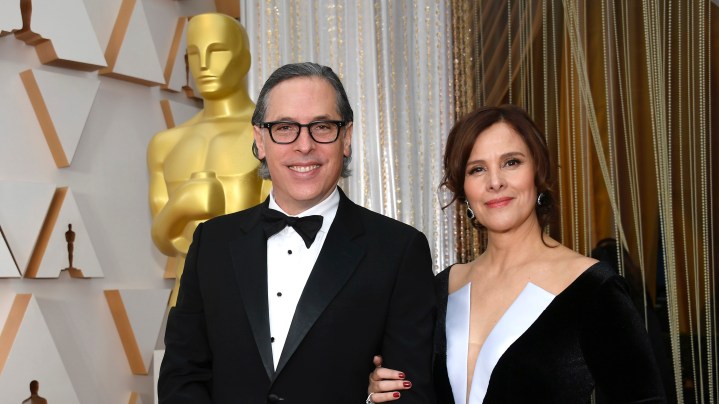These Are the Latino Nominees of the 2020 Academy Awards

Rodrigo Prieto and Monica Prieto attend the 92nd Annual Academy Awards at Hollywood and Highland on February 09, 2020 in Hollywood, California. Photo by Kevork Djansezian/Getty Images
Let’s get the infuriating news out of the way first: Jennifer Lopez, who we all hoped would wake up Monday morning to become a first-time Oscar nominee for her dazzling performance in Hustlers, was nowhere to be found when the Academy unveiled its nominations. That means that we go into another Oscar ceremony with no U.S. Latinos nominated for any acting statues — a drought that’s been going on since Rosie Perez was up for Best Supporting Actress in 1993. And while the Academy of Motion Picture Arts and Sciences narrowly avoided a repeat of #OscarSoWhite (Cynthia Erivo got in for her work in Harriet) the J.Lo snub cannot help but remind us just how bleak the statistics remain for actors of color. What they couldn’t avoid, though, was offering yet another all-male directing lineup.
No matter how much the Academy has attempted to course correct its membership demographic, it’s clear that stories that don’t center on straight white male protagonists will continue to feel like outliers. One just has to look at the films that dominated this morning’s announcement: Quentin Tarantino’s Once Upon a Time… in Hollywood, Martin Scorsese’s The Irishman and Sam Mendes’ 1917 all nabbed 10 nominations while the box office hit Joker led the way with 11. And while Greta Gerwig’s Little Women (six nominations) and South Korean hit Parasite (also six noms) had good showings, the former couldn’t crack the directing lineup while the latter couldn’t get any of its formidable ensemble any acting nominations. The only subtitled performance that made the cut this year was Antonio Banderas’ stellar work in Pedro Almodóvar’s Dolor y gloria (Pain and Glory). Well, unless you also count the many Spanish-dubbed scenes courtesy of Jonathan Pryce’s work as Jorge Mario Bergoglio (aka Pope Francis) in Fernando Meirelles’ The Two Popes. Yes, no Latin American nor U.S. Latinx actors got in but a Welsh actor playing an Argentine got a nomination. These are systemic problems that shows just how industrywide biases and blind spots carry over into awards conversations.
Which is not to say there weren’t any bright spots across the board. Mexican costume designer Mayes C. Rubeo was cited for her work on Taika Waititi’s Jojo Rabbit, Mexican-American Adam Vázquez got in as part of the visual effects team behind The Lion King, while Jonas Rivera notched yet another nomination as producer of Toy Story 4. And while we already knew that no Latin American filmmakers would be cited in the Best International Feature Film category (films like Colombia’s Monos and Brazil’s A vida invisível (An Invisible Life) didn’t make the European-heavy shortlist) but there were a number of talented filmmakers from the region who earned nominations this morning. Petra Costa‘s urgent political documentary about Brazilian politics, Edge of Democracy, earned a coveted Best Documentary (Feature) nomination, while, improbably, The Irishman proved to be the biggest booster of Latin American talent at this year’s Oscars. Its nominated visual effects team, after all, includes Argentines Pablo Helman and Leandro Estebecorena, while Scorsese’s frequent collaborator Mexican D.P. Rodrigo Prieto earned his third nomination, proof that the cinematography branch is one of the most Latino-friendly categories out there: in the last 10 years the award’s been won by a Latin American a total of 5 times, including last year when Alfonso Cuarón triumphed for his work on Roma.
But that statistic further shows how J.Lo’s snub speaks to the way U.S. Latinos in particular often get left out of these conversations. As Cuarón himself told Remezcla at last year’s awards, the gains of Latin American filmmakers like himself obscure the way U.S.-born Latino talent are nearly invisible: “There is so much talk about diversity, and I mean some progress has been made,” he said, “but definitely the Hispanic Americans — and specifically Chicanos — are really, really badly represented still.” Lopez’s nomination wouldn’t have magically fixed all of that but it would’ve at least offered a path forward. Because if J.Lo can’t even catch a break with Oscars, what hope is there for everyone else?

The 92nd Academy Awards air February 9, 2020, on ABC.